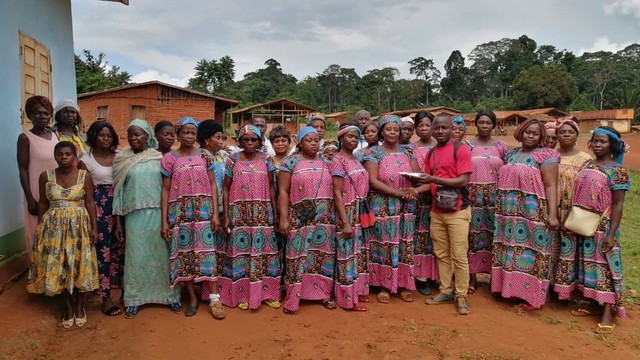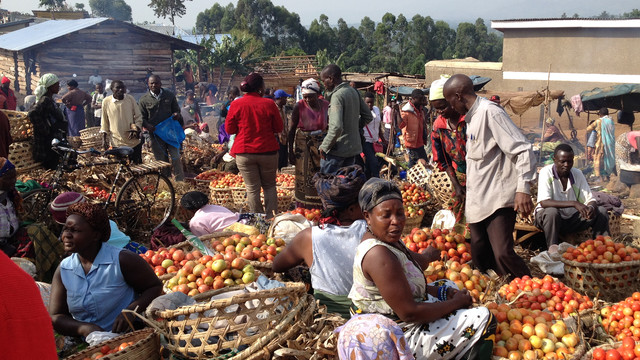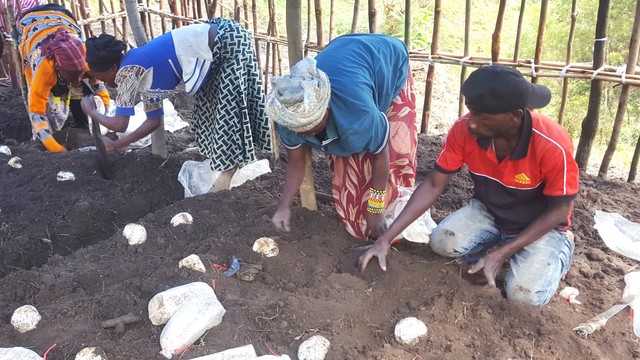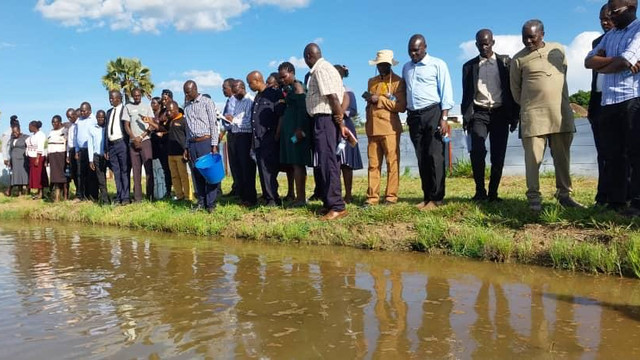Composing songs for conservation - our journey to Bwindi the Impenetrable
A project in Uganda is using music and video to promote conservation and poverty alleviation, thanks to a creative partnership.

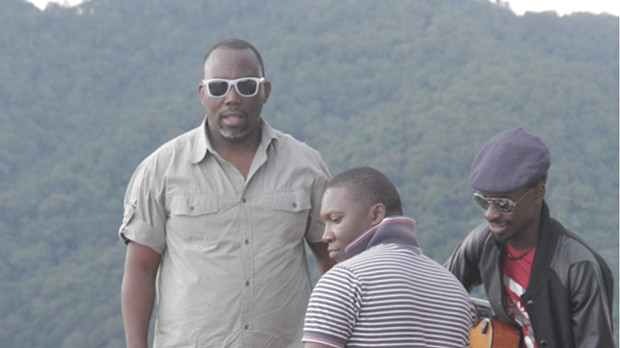
From left, musicians Wesa Kawesa, Drake and Myko Ouma learn about issues in the Bwindi Impenetrable National Park (Photo: Copyright Wesa Kawesa)
It took us 14 hours to reach Bwindi Impenetrable National Park from the Ugandan capital, Kampala – twisting along the snake-like Ruhija-Bwindi road.
We were travelling with the musician Wesa Kawesa and his production team, heading for the Gorilla Resort Camp at Buhoma – and by the time we arrived, night had fallen and the whole group was exhausted. Our beds for the night were in tents pitched on the edge of the forest, home to the mountain gorillas we wanted to protect.
The trip had been set up by the Uganda Poverty and Conservation Learning Group (U-PCLG) as part of the "Linking great apes conservation and poverty alleviation" project, which is funded by the Arcus Foundation and by UK aid. The idea was to introduce Kawesa (and his film crew) to Bwindi and provide inspiration for a song and video about great ape conservation and poverty alleviation – one of a range of alternative communication activities being developed as part of the project.
Great apes are iconic species that are highly valued by the international community and are a high priority for international conservation. They are found in areas which coincide with some of the poorest parts of the world, as is the case in Uganda.
Bwindi is home to an estimated 400 endangered mountain gorillas. Located in the Albertine Rift Valley, it is considered to be part of one of the most biologically rich ecosystems on Earth, with a large number of endemic species, and it is in one of Uganda's most important forest area for the conservation of biological diversity.
The 'imagine' song project
Drawing on the idea that music can reach across ethnic and social boundaries, U-PCLG decided to develop a song as a way to communicate a conservation and development message. As the poet, Henry Wadsworth Longfellow said: "Music is the universal language of mankind".
Working with PCI Media Impact, a not-for-profit organisation that uses alternative media to inspire positive social and environmental change, U-PCLG wanted to use the song to raise awareness about the need for equal and fair distribution of the costs and benefits from conservation activities in the park. The project will also look at a range of other communication channels including radio talk shows, comic strips and training for journalists.
Wesa Kawesa
U-PCLG had approached Kawesa – a gifted musician, author and motivational speaker, who has previously written soundtracks for award-winning movies such as The Last King of Scotland – to compose the song. It organised the trip to Bwindi to give Kawesa and his crew the chance to find inspiration and capture some of the unique and genuine Bwindi experience for the video.
On the first morning in Bwindi, the production team was up by 7am to catch the sunrise. But much to his surprise, one of the cameramen found his camera had become frozen, and would not take any pictures or video.
Once the batteries had warmed up, the group set off for the forest. Jackie, one of the musicians, looked ill-equipped in her high platform shoes, short leopard dress, and full make-up. But accompanied by two Uganda Wildlife Authority guards, she was determined to conquer the impenetrable.
As a musician and songwriter, Kawesa was keen to witness at first hand the impacts of the existing model for sharing revenues from gorilla tourism between government, hoteliers, travel and tours companies and the local communities, particularly the Bakiga and the Batwa pygmy communities, and see how this model affects their livelihoods.
We met with 23 members of the Batwa tribe and visited their former forest home, where the hunter-gatherers lived in caves and trees alongside the primates, before their relocation following the creation of the national park in 1991. Their strong culture and desire to continue living in harmony with the gorillas was clearly expressed in the songs that they performed for us.
Thanks to a local student who helped with translation, we were able to hear the community's dissatisfaction with the current revenue sharing arrangements. They told us, for instance, that in October of this year, they had received Uganda shillings 30,000/- (US$11) as their share of the park entrance fee, shared among the 23 members of the Batwa settlement in Buhoma.
This was clearly not enough to cover even their basic needs, such as having access to clean water, and being able to pay for health related costs and school fees.
Sharing the song
The song, which is currently in production, is expected to reach thousands of people, from the local communities living around Bwindi to policy-makers and other key audiences. It will be used to raise awareness about Bwindi, the communities living around it, and issues surrounding the costs and benefits from the national park.
By creating a conservation song, the project hopes to make conservation 'cool' and, through radio, TV and digital technologies, reach larger audiences. A music video is also being produced and will be distributed to local television and radio stations around central Kampala and western Uganda.
Although music is a good communication tool, it can only be effective if the message is clear and reaches the right audiences. We will, of course, be monitoring our success and will continue to share information about this project on this blog, in particular regarding the impact of the song once it has been distributed, and the other communication activities planned – such as the comic strips and radio talkshows.
By using new and unconventional forms of communication, we expect a lot of learning along the way.
Watch the conservation song: Imagine Bwindi.
Hellena Nambogwe (hnambogwe@gmail.com) is an environmental educator working with U-PCLG and PCI Media Impact as a communications coordinator for the ‘Great apes conservation and poverty alleviation project’
